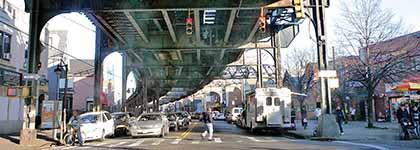By Rebecca Henely
City Councilman Daniel Dromm (D-Jackson Heights) said that as Jackson Heights’ population grows, he is concerned longtime residents, some of whom may be low-income, may become the victims of gentrification.
“I just don’t want people coming into the neighborhood and since they have more money, almost evicting other people out of the community,” he said.
In an attempt to raise consciousness about this problem, Dromm, together with the Jewish Center of Jackson Heights and the Working Families Party of Jackson Heights, sponsored an event where Arturo Ignacio Sanchez, a member of Community Board 3 and a professor at Cornell University with the City and Regional Planning Department and Latino Studies Program, spoke at the center Aug. 5 about the history of Jackson Heights’ population and how it is currently changing.
“He gave a wonderful talk to a packed house on a very technical topic,” Dromm said.
Sanchez said the center originally asked him to speak, particularly since he is writing a book on Jackson Heights’ history.
“They knew I had done a lot of work on Jackson Heights,” he said.
Dromm said Sanchez began his lecture telling residents Jackson Heights used to be a restricted community in the early 20th century, with no Jews or black people allowed. But throughout the years, the neighborhood has grown increasingly diverse.
Dromm said he wants Jackson Heights’ racial, sexual orientation and economic diversity maintained.
Sanchez said most sources of gentrification tend to come from overflow from Manhattan that extends along the East River into western Queens, development growing out of Flushing or people who have been displaced from Brooklyn. He did a survey last year of individuals who had moved into Jackson Heights and they said they had come to the neighborhood for affordable and good housing and the ethnic and social diversity.
“As Jackson Heights becomes a more attractive place to live in … that diversity that attracted people is increasingly at risk,” he said.
He said he worried the most about small businesses in the community, many of which tend to be immigrant-based, being replaced by chain stores.
“That changes the quality of life,” he said.
But Sanchez and Dromm said that while they worried about gentrification, they believed most people coming to the area are progressive and willing to form a community with their lower-income neighbors.
“Folks here are very, very concerned about maintaining this quality of life,” Sanchez said.
Dromm said Sanchez helped those at the lecture empathize with the longtime residents.
“Arturo’s explanation of immigrant patterns opened eyes, and people were able to see similarities [between] their ancestors and those there now,” Dromm said.
Reach reporter Rebecca Henely by e-mail at rhenely@cnglocal.com or by phone at 718-260-4564.



































